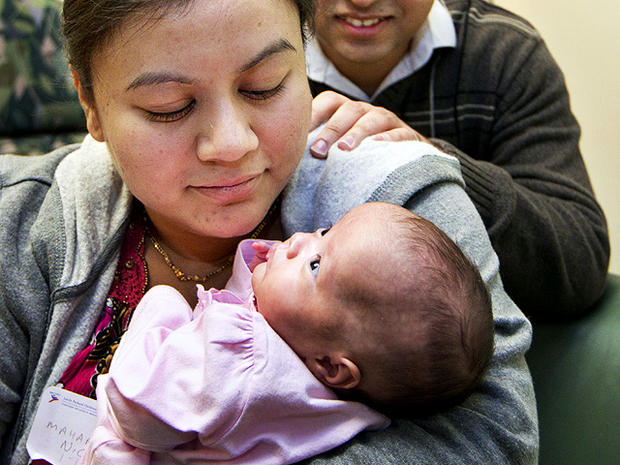15-minute-old premature newborn receives pacemaker
(CBS/AP) At just 15 minutes old and weighing 3.5 pounds, Jaya Maharaj became one of the smallest people ever to receive a pacemaker.
Diagnosed in the womb with a severe heart ailment, Jaya was born nine weeks premature with a heart rate of 45 beats per minute - compared with a healthy newborn heartbeat of 120 to 150 beats per minute.
According to her doctors at Stanford University's Lucile Packard Children's Hospital, Jaya would only have hours to live if they didn't perform surgery.
"The only way to save this baby was to deliver the baby right away and then the pacemaker," said Dr. Katsuhide Maeda, the surgeon who stitched the pacemaker's electrical leads to Jaya's walnut-sized heart.
It was during a routine prenatal visit that parents Leanne Maharaj, 26, and Kamneel Maharaj, 31, learned their first child's heart rate was dangerously low. They learned that their daughter suffered from congenital heart block, in which the mother's immune system mistakenly attacks the nerve fibers that cause the fetus' heart to beat.
The prognosis was grim: Doctors would have to induce labor and force the baby to be born as early as possible to correct the ailment before her heart failed. But Jaya grew and gained weight as her parents waited, giving them hope.
"We were worried, but at the same time we were hopeful that she was fighting inside and doing the best she can," said Kamneel Maharaj, an information technology manager in Silicon Valley.
Dr. Valerie Chock, the neonatologist who counseled the couple, said determining when the baby should be born involves a delicate set of calculations. The baby should be delivered as soon as possible while still allowing her to gestate so her organs develop enough to support life outside the womb. The doctors settled on 31 weeks as the delivery date.
"Unfortunately, a lot of babies in this position don't even survive childbirth," Chock said. According to Stanford School of Medicine, research has shown that 20 to 50 percent of patients diagnosed prenatally die in utero or in the first weeks after birth.
A team of about 20 people were involved in the delivery, in which both speed and caution were essential. The delivery went smoothly - but Jaya's heart was beating so slowly that surgeon Maeda decided to open her chest immediately to perform the operation.
Typically in such cases, a surgeon would connect wires attached to a pacemaker outside the body then perform a second surgery weeks later to install a permanent device. Maeda decided to tackle the more difficult challenge of inserting the permanent pacemaker immediately to avoid the second surgery. The whole process took about an hour.
The current pacemaker should last Jaya about 10 years, Maeda said. It will need to be repositioned as she grows, and she will need new batteries every five to seven years, but Jaya will otherwise be able to lead a normal life.
Dr. Michael Artman, the chief pediatrician at Children's Mercy Hospital in Kansas City, Mo., and a neonatal cardiologist, described the surgery as an impressive accomplishment that could encourage other children's hospitals to undertake similar efforts.
"What really distinguishes this is just the fragility of this premature baby and the condition in which this baby was born," Artman said. He said that while inserting a pacemaker is not itself the most technically challenging kind of surgery, the coordination of the large team needed to pull off the entire procedure poses a major challenge.
"Whenever we were worried, she would kick from inside and say, `I'm here; I'm alive!'" Kamneel Maharaj said. "We thought maybe she was trying to tell us that everything was OK, so we were always hopeful."
According to the Stanford School of Medicine, Jaya is smaller than any pacemaker recipient ever reported in the medical literature. Today, at a little less than three months old, she weighs more than 8 pounds and is thriving.
